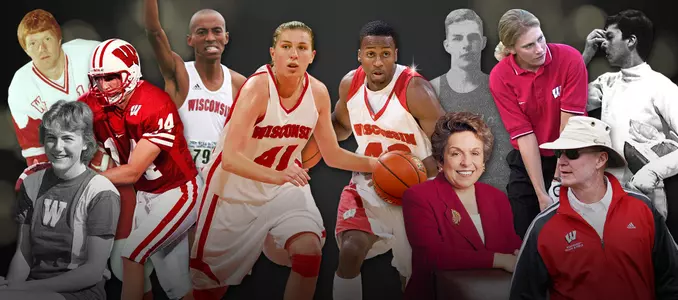
2018 UW Athletic Hall of Fame: Alando Tucker
July 19, 2018 | General News, Men's Basketball, Mike Lucas
Badgers’ all-time leading scorer overcame injuries to be All-American
 |
||
|
BY MIKE LUCAS
UWBadgers.com Senior Writer
MADISON, Wis. — Alando Tucker's path to the University of Wisconsin Athletic Hall of Fame ran into an early detour; an injury setback so severe that he contemplated a worst-case scenario at the fragile age of 19.
"A lot of people saw the accolades," he said. "They saw what I accomplished. They saw me as the all-time leading scorer. They saw the records and they saw all the winning during that time."
People, in fact, saw Tucker break Michael Finley's record with 2,217 career points. They saw Tucker become the first Badger to lead the Big Ten in scoring since Don Rehfeldt in 1950.
They saw Tucker set school marks for games played (134), starts (126), minutes played (4,297), field goals (798), free throws (520), free throw attempts (817) and offensive rebounds (769).
They saw Tucker honored as a consensus first-team All-American and Big Ten Player of the Year while being a 2007 finalist for the Naismith, Wooden and Rupp Awards and the Oscar Robertson trophy.
They saw Tucker help lead the Badgers to 24 wins, a Big Ten title and a Sweet 16 as a freshman; 25 wins and a Sweet 16 as a redshirt sophomore, and 30 wins and a No. 1 national ranking as a senior.

What didn't they see? They didn't see another side, a darker side of his career.
"I was so distraught, I didn't know which way to turn," he said. "I can say now that I was in a state of depression. I didn't take school seriously. I started missing classes heavily.
"I asked myself, 'What do I do from here? Is it over? Is this it?'"
The distress was real.
After an auspicious freshman debut, starting 27 of 32 games, punctuated by 24 points and 18 rebounds in his sixth collegiate appearance, Tucker was feeling good about himself and the team.
Rightly so. The Badgers were coming off their first outright Big Ten title since 1947.
"People were saying with Devin (Harris) and me coming back my sophomore year, we were going to be the team to beat," he said, also noting Mike Wilkinson's and Freddie Owens' return.
"I was working with the junior Olympic program and I was getting a lot of notoriety and I was thinking, 'I'm setting myself up on the right path.' And, then, I took a step back."
Tucker missed the first five games of the 2003-2004 season with a foot fracture that sidelined him for eight weeks overall. He didn't see any action until December and was eased into the lineup.
In this third game back, he started and had 17 points in 31 minutes in a win over Marquette. And he followed that up with 22 points against Ohio University in the Rock-n-Roll Shootout in Cleveland.
"In the last seconds of that game," Tucker recalled, "I just made a basket and I looked at the bench and Coach (Bo) Ryan was about to sub out his starters.
"I was back-pedaling, and I tried to turn around and my foot stuck in the ground. I was thinking that it was just a sprained ankle because it was feeling that way."
Tucker sat out the next game at Alabama and got an MRI when the team returned to Madison. The news was bad. Tucker had fractured the fifth metatarsal, the long bone on the outside of the foot.
The Jones fracture, a common basketball injury, forced him to take a medical redshirt.
"When I found out, I was devastated … I remember sitting in tears with Henry," said Tucker, referring to UW athletic trainer Henry Perez-Guerra, a central figure in his ultimate recovery.
"I had fought hard for eight weeks to come back. And to be told my foot was broken again and I'd be done for the season was heartbreaking.
"I had broken bones before, but this was the first time I was going to be out for an extended period and I had a lot of doubts. It was the first time I really started questioning myself.
"I questioned school and I had trouble in school. I slacked in my rehab. I was in a place I really didn't know. A Jones fracture is a critical injury especially for a jumper like me."
The worse-case scenario crossed his mind: he might not play again.
"When you're a young kid like that," he said, "you just never know …"
Tucker was living with a couple of teammates — Ray Nixon and Boo Wade.
"They were a shoulder to lean on and confide in," he said. "They were there for me."
So was his older brother Antonio. "I talked to him all the time," he said.
Perez-Guerra was his life preserver, especially when Tucker was questioning everything. Perez-Guerra kept him afloat emotionally during the grueling rehab and any moments of uncertainty.
"Henry kept reassuring me, 'You're going to get back and I'm going to make sure you get back; I promise you that,'" Tucker remembered. "His belief in me was the thing that pushed me over the top.
"You can only hope that you can keep training and you can put yourself back on that path."
But where would that path lead?
"I never imagined," he said, "I would end up in the Hall of Fame."
• • • •
Today, the 34-year-old Tucker does not hesitate to share his story. As the UW's Director of Student-Athlete Engagement, he can reach out and connect with others, male or female, in all sports.
"I can be empathetic with kids who are not playing and have to sit out a redshirt year," he said. "I experienced that … the rehab process … I had to rehab a whole year just to get back.
"So, I have that added perspective and genuine understanding when someone gets injured. I can tell them, 'Look where I came from. This is what I had to do to get here. These are the steps.'"
After missing all but four games of his sophomore year, Tucker was in the starting lineup for the 2004 season opener. In his fourth game back, he scored a career-high 27 points against Maryland.
Tucker started 30 of 31 games and led the Badgers in scoring with a 15.2 average. In addition, he hit a couple of clutch, buzzer-beaters against Indiana (a put-back) and Iowa (a Steph Curry-length 3-pointer).
"Game-winning shots," Tucker said, "are among the biggest moments in an athlete's career."
If there were any questions on whether he was back on that path, whether he could return to his form prior to the injury, or even exceed it, they were answered.
Or they soon would be. Over his final two seasons at Wisconsin, Tucker started 67 consecutive games, scored in double-figures in 43 straight, and averaged nearly 20 points and 5 rebounds.
Tucker loved the big stage. As a senior, he averaged 21 points in the Badgers' 15 nationally televised games, including four against ranked opponents. He had 32 against No. 2 Pittsburgh.
In 2007, Tucker was a first-round draft pick (No. 29 overall) of the Phoenix Suns. While he played in just 47 games over three years with the Suns, he made some life-long friends.
Shaq, for one. One very big friend.
In June, they were reunited when Shaquille O'Neal was in Madison to appear at the American Family golf tournament. DJ Shaq, as he's known, also performed at the REO Speedwagon concert.
Despite his tight schedule, O'Neal found the time to make an appearance at the Kohl Center where he visited with UW basketball players, coaches and, of course, Tucker.
Deisel-sized thanks to @SHAQ for stopping by on his way to @amfamchamp to talk to the team.
— Wisconsin Basketball (@BadgerMBB) June 22, 2018
"I was an avid Bulls fan growing up," said Tucker, who was raised outside of Chicago in the Lockport/Joliet, Illinois area. "My bedroom walls were draped with Bulls posters. Jordan, Pippen, Rodman, Kerr.
"The only two people that I had on my wall outside of the Bulls were Grant Hill and Shaq. The irony was that I would get to play with both of them in Phoenix."
Steve Nash, Amar'e Stoudemire and Shawn Marion were also on that Suns roster during Tucker's rookie season. Mike D'Antoni was the head coach and Steve Kerr was in the front office.
"Shaq would always take me under his wing," Tucker said. "I was always with him. We'd be the jokesters in the locker room and we just naturally gravitated to each other."
On the impact that O'Neal's words had on the Badgers, Tucker said, "Any time you have an elite player of that stature who has accomplished so much, their message resonates with the players.
"When he speaks, everyone listens. You need that credibility.
"Shaq talked about how hard you have to work. And even when you think you're pushing yourself, if coach asks you to run nine times, you need to run 10 times. It amplified my own message."

Tucker expects a large turnout from his hometown at the Hall of Fame induction. He even asked some W Club officials, "Just tell me my (ticket) limit because I can bring the whole city here."
Virginia head coach Tony Bennett, a former UW assistant, is on his wish list of attendees.
"He played a huge part in why I came to Wisconsin," he said.
Antonio Tucker will be there. He has always been there for Alando. "My brother was a father figure for me growing up," he said. "He kept me on the straight and narrow path."
Lisa Tucker, no doubt, will be very proud of her son. The feeling will be mutual for Alando.
"She was a single mother raising five kids and making $13,000 a year," he said. "That's self-explanatory. That's dedication to keep us on a path that avoided the gang environment.
"She always talked to us about supporting each other and taking care of each other as a family. I saw her dedication in going to work every single day making sure to give us the necessities of life.
"I will try to hold back my emotions that night."
He was getting emotional. As he does when speaking about his wife, Krystal.
"She has been my rock — my best friend," he said. "She has been the person that has always kept me level-headed, even in sports, she was my foundation."
That was particularly important over a seven-year stretch when Tucker was extending his professional basketball career in Puerto Rico, Russia, Spain, Slovakia, France and Israel.
The logistics can be tough on a family. (The couple has two boys: Amir, 8; and Asaiah, 1.)
"You couldn't ask for a better mother," he said, "because I was always traveling abroad."
After learning of his Hall of Fame selection, Tucker admitted that the magnitude of it all didn't sink in right away. A couple of weeks later, though, it came into focus when he was with Amir.
"Everything is predicated on leaving a legacy for him," Tucker pointed out. "And when I looked at his face … (pause) … that's when it all hit me."
UW Athletic Hall of Fame Class of 2018
- Jolene Anderson, women's basketball
- Simon Bairu, men's cross country, men's track and field
- Allie Blomquist, women's golf
- Bill Chandler, men's basketball
- Tim Gillham, men's fencing
- Jim Johannson, men's hockey
- Ed Nuttycombe, men's cross country and men's track & field
- Donna Shalala, University of Wisconsin Chancellor
- Kevin Stemke, football
- Kris Thorsness, women's rowing
- Alando Tucker, men's basketball













